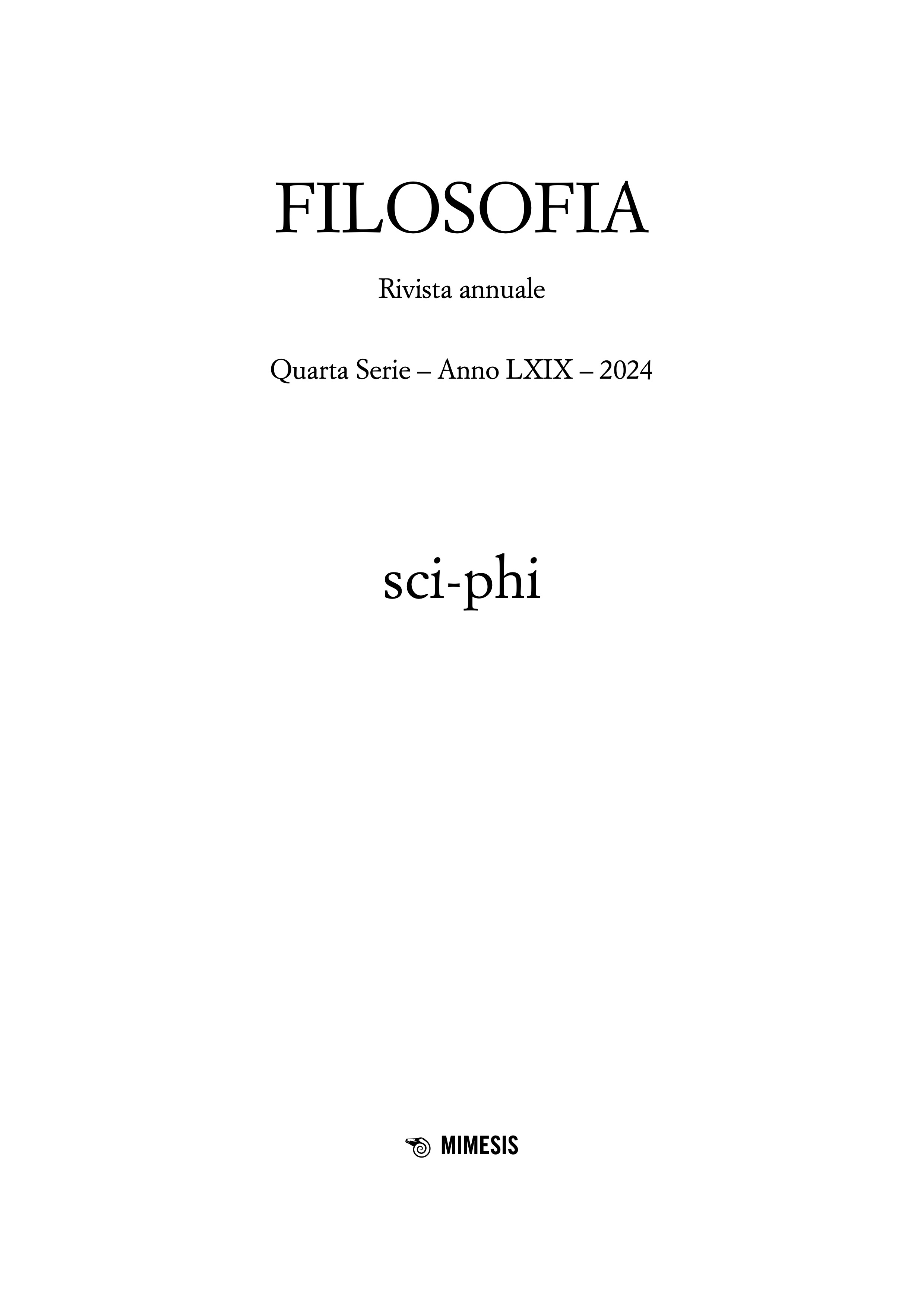De-humanizing the World to Rethink the Human-Technology Relationship: From Guido Morselli’s Dissipatio H.G. to Peter Sloterdijk’s Homeotechnology
DOI:
https://doi.org/10.13135/2704-8195/11196Keywords:
Guido Morselli, Dissipatio H.G., Anthropocene, Peter Sloterdijk, Allo/HomeotechnologyAbstract
This article examines Guido Morselli’s novel Dissipatio H.G., focusing on its exploration of the human-technology relationship. After discussing the hybrid nature of the work, which blends science fiction and philosophy, I delve into its narrative by emphasizing the theoretical functions of its peculiar post-apocalyptic setting. In particular, I engage with what I shall present as the de-humanization of the world, which serves as a backdrop for addressing issues concerning the Anthropocene, where the trinomial human/technology/nature is at stake. Based on this foundation, this study then develops a dialogue between Morselli’s work and contemporary philosophy of technology, with a particular emphasis on Peter Sloterdijk’s thought. Within these contours, I first aim to show how Morselli presciently anticipated certain themes of Sloterdijk’s philosophy, and, second, demonstrate how the latter can enrich the former’s discourse, especially through the introduction of the concept of homeotechnology.
Downloads
References
Ballard, James Graham. 2014. Fictions of Every Kind in #Accelerate: The Accelerationist Reader, Mackay, Robin, and Avanessian Armin, eds., 235-240. Falmouth: Urbanomic.
Bostrom, Nick. 2014. Superintelligence: Paths, Dangers, Strategies. Oxford: Oxford University Press.
Ceccherini, Riccardo. 2015. “Influenze del Romanzo Apocalittico in Dissipatio H.G”. La Fusta 19. https://lafusta.blogs.rutgers.edu/files/2015/12/MorselliLaFusta.pdf.
Crutzen, Paul J. 2006. The ‘Anthropocene’ in Earth System Science in the Anthropocene, Eckart Ehlers, and Krafft Thomas, eds., 13-18. Berlin: Springer.
Dick, Philip K. 2010. Do Androids Dream of Electric Sheep?. London: Gateway.
Distefano, Giovanni Vito. 2022. “La scrittura dopo la fine. Per un’antropologia del romanzo di for- mazione post-apocalittico”. Enthymema, n. XXXI: 240-261. http://dx.doi.org/10.54103/2037-2426/18428.
Ellul, Jacques. 1964. The Technological Society (1954). Eng. tr by John Wilkinson. New York: Vintage Books.
Ferreira de Barros, Matheus, Lemmens Pieter, and Marco Pavanini. 2023. “Peter Sloterdijk’s Philosophy of Technology: From Anthropogenesis to the Anthropocene”. Technophany 1, n. 2: 84-123. https://doi.org/10.54195/technophany.13602.
Gratton, Andrea. 2009. “In viaggio attraverso le coordinate di un silenzio: breve introduzione all’opera narrativa di Guido Morselli”. Quaderns d’Italià 14: 149-176. https://doi. org/10.5565/rev/qdi.252.
Guaraldo, Emiliano Rodriguez. 2022. Investigating the Extinction Crime Scene: Guido Morselli’s Eco-political Manifesto and the Forensic Gaze of the Anthropocene in Italy and the Ecological Imagination: Ecocritical Theories and Practices, Benvegnù, Damiano, and Gilebbi Matteo, eds., 157-173. Wilmington: Vernon Press.
Heidegger, Martin. 1962. Being and Time (1927). Eng. tr. John Macquarrie, and Edward Robinson. London: Blackwell.
———. 1977. The question Concerning Technology and Other Essays. Eng. tr. William Lovitt. New York and London: Garland.
Kurzweil, Ray. 2005. The Singularity Is Near: When Humans Transcend Biology. New York: Viking.
McCarthy, Cormac. 2006. The Road. New York: Alfred A. Knopf.
Morselli, Guido. 2007. Proust o del sentimento (1943). Torino: Ananke.
———. 1947. Realismo e fantasia. Milano: Bocca.
———. 2016. Roma senza papa: cronache romane di fine secolo ventesimo (1974). Milano: Adelphi.
———. 2012. Contro-passato prossimo (1975). Milano: Adelphi.
———. 1977. Dissipatio H.G. Milano: Adelphi.
———. 1988. Diario. Milano: Adelphi.
———. 2020. Dissipatio H.G.: The Vanishing. Eng. tr. Frederika Randall. New York: New York Review of Books.
Mussgnug, Florian. 2003. “Finire il Mondo. Per un’Analisi del Romanzo Apocalittico Italiano
degli Anni Settanta”. Contemporanea: rivista di studi sulla letteratura e sulla comunicazione, no. 1: 1000-1014.
Muzzioli, Francesco. 2021. Scritture della catastrofe. Istruzioni e ragguagli per un viaggio nelle distopie. Milano: Meltemi.
Pischedda, Bruno. 2000. Morselli: una ‘Dissipatio’ molto postmoderna. Filologia antica e moderna, 19: 163-89.
———. 2004. La grande sera del mondo. Torino: Aragno.
Reich, Charles. 1970. The Greening of America. New York: Random House.
Risso, Roberto. 2021. ‘The End of the World? Let Me Die’: Guido Morselli’s Dissipatio H.G.
Between Suicide and Mankind’s Dissolution in Suicide in Modern Literature: Social Causes, Existential Reasons, and Prevention Strategies, Velasco Josefa Ros, ed., 171-183. Berlin: Springer.
Sielo, Francesco. 2016. “‘Niente da Ridere’: Le Apocalissi Ironiche di G. Morselli e M. P. Shiel”. Between Journal VI (12): 1-22. https://ojs.unica.it/index.php/between/article/ view/2199/2286.
Sloterdijk, Peter. 2013. You Must Change Your Life: On Anthropotechnics. Eng. tr. Wieland Hoban. Cambridge: Polity.
———. 2017. Not Saved: Essays After Heidegger. Eng. tr. Ian Alexander Moore, and Christopher Turner. Cambridge: Polity.
———. 2018. What Happened in the 20th Century. Eng. tr. Christopher Turner. Cambridge: Polity.
Sloterdijk, Peter, and Hans-Jürgen Heinrichs. 2014. El sol y la muerte: Investigaciones dialógicas. Eng. tr. Germán Cano. Madrid: Siruela.
Sorgner, Stefan Lorenz. 2009. “Nietzsche, the Overhuman, and Transhumanism”. Journal of Evolution and Technology 20, n. 1: 29-42. http://jetpress.org/v20/sorgner.htm.
Stiegler, Bernard. 2019. The Age of Disruption: Technology and Madness in Computational Capitalism. Eng. tr. Daniel Ross. Cambridge: Polity.
Toffler, Alvin. 1970. Future Shock. New York: Random House.
Tortoreto, Andrea. 2018. Filosofia della fantascienza. Milano: Mimesis.
Downloads
Published
How to Cite
Issue
Section
License
Copyright (c) 2024 Stefano Moioli

This work is licensed under a Creative Commons Attribution 4.0 International License.
This work is licensed under a Creative Commons Attribution 4.0 International License



